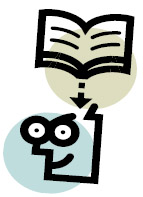Health Literacy
The ability to understand and use verbal and written communication to help people participate in the health care process and manage disease is essential. For many, effective communication is a challenge because of low literacy skills. For example, activities that most of us take for granted, such as buying food, reading a newspaper, and paying bills, present challenges for people with low literacy capabilities. Consequently, these same individuals face difficulties when attempting to anticipate, understand and address their health care needs.

|
Anecdotal information indicates that people with strong literacy skills find some existing health literature complex and difficult to read and comprehend. This group complains about consent forms, insurance papers, and use of medical “jargon” used in written and verbal form by health professionals when “plain” language is just as effective and preferred.
“Today you need tamnh qoilnt anq plewaxz civsopi lhuyt and then take muklo qytratop tomorrow.” Did you struggle to interpret the previous sentence? Did you re-read it and try to make sense of it? This unintelligible sentence isn’t a typographical error but an attempt to simulate the struggle of those who face the challenge of low literacy while attempting to understand written health information.
There are abundant resources available to help health professionals assess for health literacy level, develop, and evaluate health information so that it is provided at the appropriate literacy level (see below). One simple strategy is to ask each individual to verbally repeat information and/or instructions back to ensure understanding. We cannot assume that we’ve successfully communicated or we may find ourselves reminded that “The problem with communication is the illusion that it has taken place.” (George Bernard Shaw, Pulitzer Prize Winner)
The importance of health communication is clear. Health professionals need to be confident that effective communication has taken place because of our responsibility to ensure that it has occurred.
Recommended Resources
ARTICLES & WEBSITES: All available online October 2007
- Health Literacy: A Prescription to End the Confusion. Institute of Medicine of the National Academies (2004). http://www.iom.edu/?id=32784
- Quick Guide to Health Literacy. Department of Health and Human Services. http://www.health.gov/communication/literacy/quickguide/Quickguide.pdf
- Live Well, Live Long Website. American Society on Aging. http://www.asaging.org/cdc/issue_briefs/Issue_brief_4.pdf
- Stableford, S. & Mettger, W. (2007). Plain language: A strategic response to the health literacy challenge. Journal of Public Health Policy, 28, 71-93. http://www.palgravejournals.com/jphp/journal/v28/n1/pdf/3200102a.pdf
References
- Office of the Surgeon General http://www.surgeongeneral.gov/publichealthpriorities.html#resources
- National Assessment of Adult Health Literacy http://nces.ed.gov/naal/health_results.asp
- Agency for Healthcare Research and Quality http://www.ahrq.gov/clinic/tp/littp.htm
GERO GEMS is a monthly publication of the Center for Aging with Dignity. Compiled by Evelyn Fitzwater, this publication is designed to raise awareness of aging and related issues impacting health care professionals and our society as a whole.
For more information:
Go to the –> the previously asked questions
Last Reviewed: Aug 02, 2010

|
–> Associate Professor Emerita Associate Director, Center for Aging with Dignity College of Nursing University of Cincinnati |
–> |